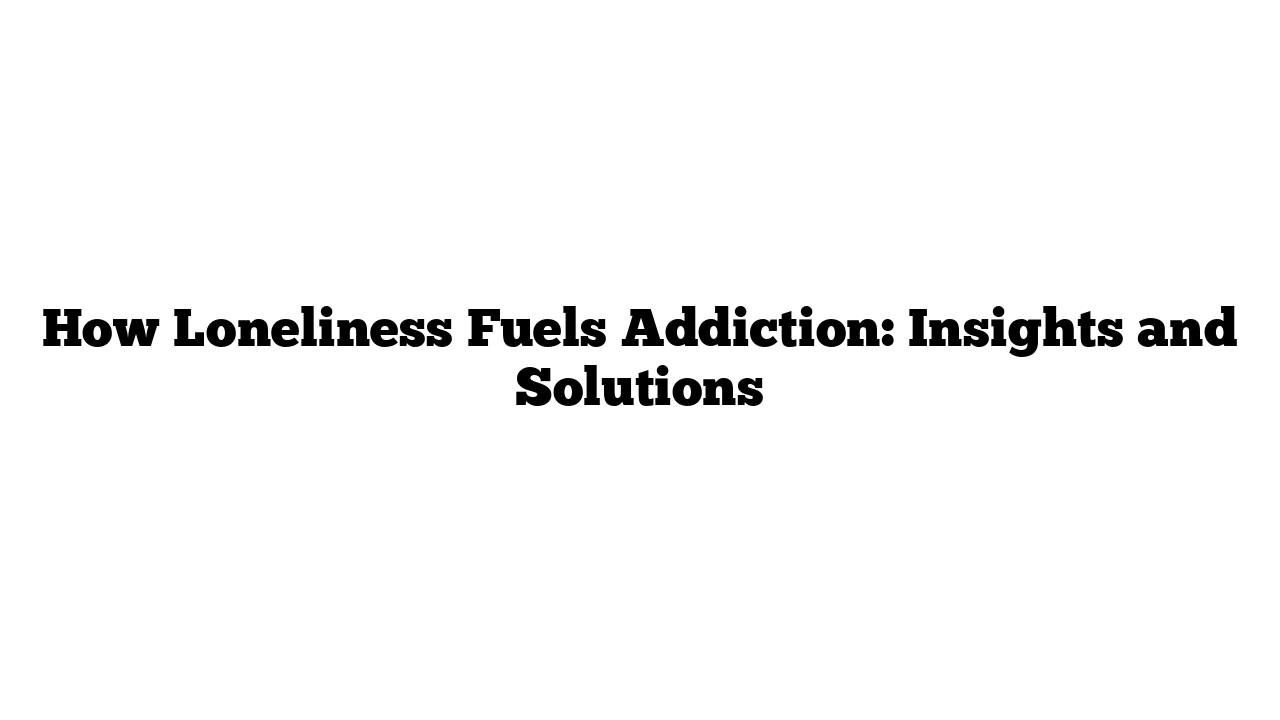Have you ever wondered why some people become addicted to substances or activities while others don’t? Research suggests that loneliness plays a significant role. In fact, a groundbreaking study from the 1970s involving rats—yes, rats—revealed surprising insights about addiction and its connection to isolation.
This article dives deep into the relationship between loneliness and addiction, backed by research and practical advice to overcome these challenges.
What Rat Park Taught Us About Addiction
The famous “Rat Park” experiment fundamentally changed our understanding of addiction. Here’s how it worked:
Imagine you’re a rat in a cage. You’re all alone, with two choices: drink plain water or a sweet morphine solution. With no companionship or stimulation, you’d likely turn to the morphine to pass the time.
Now, contrast this with Rat Park—a lively, engaging space where rats live with others, play, and explore. When offered the same water and morphine, the rats in Rat Park seldom chose the drug. Even those previously addicted significantly reduced their morphine intake after moving to Rat Park.
The takeaway? Loneliness and lack of purpose drive addiction, while connection and engagement help reduce it.
Understanding Addiction in Our Modern World
Addiction isn’t limited to hard drugs or alcohol. It can include:
- Substances: Cigarettes, caffeine, prescription medications.
- Behaviors: Video gaming, social media scrolling, or even workaholism.
While the severity varies, the underlying factor remains: a lack of purpose and connection often drives addiction.
Why Loneliness Increases Addiction Risk
In today’s digital age, we are more connected than ever but feel lonelier. We may have hundreds of social media “friends,” yet lack meaningful, face-to-face relationships. This void often leads to:
- Using substances or behaviors to numb pain: Drugs, alcohol, or even excessive gaming distract from feelings of isolation.
- Avoiding life changes: Rather than pursuing fulfilling careers or relationships, addictions fill the gaps.
How Relationships Protect Against Addiction
Having meaningful relationships can act as a buffer against addiction. Here’s how:
- Purpose Through Connection
A strong support system instills purpose. Sharing love—whether through family, friends, or volunteer work—gives life meaning. - Positive Peer Influence
Surrounding yourself with people who avoid harmful habits makes it easier to stay on track. In contrast, a group that normalizes addictive behaviors can push you toward them. - Support in Recovery
Programs like Alcoholics Anonymous rely on sponsors to provide understanding, encouragement, and accountability. These relationships show how human connection aids recovery.
Not All Addictions Stem from Loneliness
While loneliness is a major driver of addiction, it’s not the sole cause. Social factors also play a role. For instance:
- Peer pressure: Being the only sober person in a group can feel isolating, pushing individuals toward harmful habits.
- Superficial connections: Even if surrounded by people, shallow relationships fail to provide the emotional support needed to overcome addiction.
Building Resilience and Connection
Maslow’s Hierarchy of Needs teaches us that love and belonging are essential for well-being. Without these, people often turn to addictive behaviors. Here’s how to rebuild those connections:
- Strengthen Emotional Resilience
- Learn to trust yourself and others.
- Develop hobbies or skills that boost self-esteem.
- Create Fulfilling Relationships
- Focus on quality, not quantity.
- Join groups, volunteer, or find shared interests to meet like-minded individuals.
- Seek Professional Support
- Counselors and support groups can help address underlying emotional pain that fuels addiction.
A Word of Caution: Avoiding Replacement Addictions
As you move away from harmful addictions, it’s essential to avoid replacing them with unhealthy dependencies on others. Over-reliance on friends or family can strain relationships and hinder personal growth.
Supportive connections are vital, but they must be balanced with independence and self-trust.
The Root of Addiction: Filling the Void
At its core, addiction often stems from a void—a craving for connection, purpose, or understanding. Whether it’s drugs, alcohol, or video games, these behaviors provide temporary relief but fail to address the underlying need for human connection.
We’re not so different from the rats in Rat Park. When our emotional and social needs are met, addictive behaviors naturally diminish.
Final Thoughts: Healing Through Connection
Loneliness can shake your self-esteem and sense of purpose, making you more vulnerable to addiction. The cure lies in reaching out to others and building meaningful relationships while also cultivating independence and emotional resilience.
Remember, healing isn’t just about avoiding harmful behaviors—it’s about filling your life with connections, purpose, and joy.
FAQs
1. What is Rat Park?
Rat Park was an experiment demonstrating how social interaction reduces addiction in rats.
2. Can loneliness cause addiction?
Yes, loneliness often creates a void that individuals attempt to fill with addictive behaviors.
3. Are all addictions equally harmful?
No, the severity varies. While some addictions are life-threatening, others are less harmful but still affect well-being.
4. How does purpose help fight addiction?
Purpose provides motivation and reduces the desire to escape through addictive behaviors.
5. Can relationships help with addiction recovery?
Yes, supportive relationships are crucial for recovery and provide accountability and encouragement.
6. Can addiction occur even in social settings?
Yes, social addictions like alcohol or party drugs are common but can still stem from emotional voids.
7. Why are sponsors important in recovery?
Sponsors offer guidance, understanding, and accountability, making recovery less isolating.
8. What are replacement addictions?
These occur when someone swaps one harmful addiction for another, such as over-reliance on others.
9. How can I rebuild my social life to avoid addiction?
Join community groups, volunteer, or pursue hobbies to meet supportive, like-minded individuals.
10. Is professional help necessary for overcoming addiction?
While not always required, professional help can address the underlying emotional issues that fuel addiction.
Reference websites:
- Visit medicaltimes.io for trusted health articles.
- National Institute on Drug Abuse: www.drugabuse.gov
- Mayo Clinic: www.mayoclinic.org
- Psychology Today: www.psychologytoday.com
